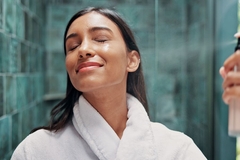Äio secures funding for upcycled beauty oils using yeast fermentation

Äio has received a grant from the Estonian government to speed up production of its yeast-derived sustainable fat alternative for cosmetic formulations. The company turns agricultural byproducts, such as wood, into fats and oils through yeast fermentation.
The €1 million (US$1.16 million) grant comes ahead of the EU’s Deforestation Regulation (EUDR), which will take effect later this year. Äio says the funds will speed up the production of sustainable alternatives amid the new regulation banning deforestation throughout the entire supply chain.
“Äio’s solution utilises biomass fermentation to create sustainable alternatives to traditional plant- and fossil-based oils. At the heart of our technology is the ability to convert low-value industrial side streams into high-value specialty lipids,” Magdalena Koziol, head of cosmetics development at Äio, tells Personal Care Insights.

“By utilizing these locally sourced side streams, we reduce waste, support circular economy principles, and significantly lower the environmental footprint of raw material sourcing. Our proprietary yeast strain plays a crucial role in this process.”
The new money will go toward supporting a three-year project, which was received through an Applied Research Program organized by the Estonian Business and Innovation Agency.
 Äio uses yeast, a red yeast microbe, in a process similar to brewing beer.Fermenting for cosmetics
Äio uses yeast, a red yeast microbe, in a process similar to brewing beer.Fermenting for cosmetics
Äio uses a red yeast microbe in a process similar to brewing beer. It can be used in several cosmetic applications and replace commonly used, environmentally harmful ingredients.
The oil alternative uses 97% less land and 90% less water than palm oil production. “Conventional oils used in cosmetics are often linked to deforestation, water overuse, biodiversity loss, and ethical concerns,” says Koziol.
“They also face increasing regulatory pressure and supply instability. Äio provides a sustainable, traceable, and locally sourced high-performance alternative using fermentation, minimizing environmental harm and supporting clean, ethical, and future-proof formulations.”
She explains that the cosmetic applications from this process are “almost limitless,” and that Äio offers a drop-in solution for partners looking for alternatives to plant and mineral oils.
The ingredients can be incorporated into emulsions, waterless formulations, face and body care products, cleansing products, detergents, hair care products, and makeup.
The innovation also aims to replace certain unsustainable ingredients. “Most cosmetic products include some form of lipid, oil, or fatty acid, and the industry heavily relies on tropical fats or petroleum-derived sources, raising sustainability and supply concerns,” says Koziol.
“Äio’s ingredients offer an alternative to those raw materials while maintaining cost-effectiveness, functionality, and performance. They also align with global trends toward circular economy and biotechnology-derived ingredients in personal care.”
Global expansion
The company aims to launch its first product by the end of 2025.
“With the support from the Estonian Business and Innovation Agency, we can expand our product portfolio by developing alternative green extraction methods and biomass valorization strategies to achieve full circularity,” says Koziol.
“In parallel, we’re advancing precision fermentation using newly developed strains to produce tailor-made, high-value products, all in compliance with regulatory and industry standards.”
To expand internationally, Äio aims to reach a 100,000-liter benchmark by the end of the year — so far, it has reached 10,000 liters. The company is actively seeking partners and contract manufacturers to help in the production and development process.
Phasing out palm oil The funding is received ahead of the EUDR, coming into effect at the end of the year.
The funding is received ahead of the EUDR, coming into effect at the end of the year.
The funding is received ahead of the EUDR, which will come into effect at the end of the year. Koziol details: “This regulation has significant implications for industries that rely on the commodities covered under the EUDR, such as palm oil for the personal care industry.”
Personal Care Insights previously spoke to Levur about palm oil production and sourcing for cosmetics.
“An estimated forest area of 300 football fields is cleared every hour for palm plantations. Such land clearing destroys habitats of endangered species, such as orangutans and tigers, and releases massive carbon emissions,” Thomas Collier, CEO at Levur, told us.
The EUDR regulation aims to reduce global deforestation, lower carbon emissions, and promote sustainable supply chains, and requires full traceability in the palm oil supply chain.
“Only about 19% of global palm oil is certified by the Roundtable on Sustainable Palm Oil (RSPO). Since even RSPO-certified palm oil must meet additional EUDR requirements, stricter sourcing regulations will likely lead to higher palm oil prices in the EU market,” says Koziol.
“For brands, this means increased compliance and ingredient costs, which may lead to higher product prices. Brands, especially in the EU, should start thinking about the industry-wide shift away from these tropical fats and bring the focus onto locally sourced alternatives. But knowing the industry, this will take years, if not decades.”













